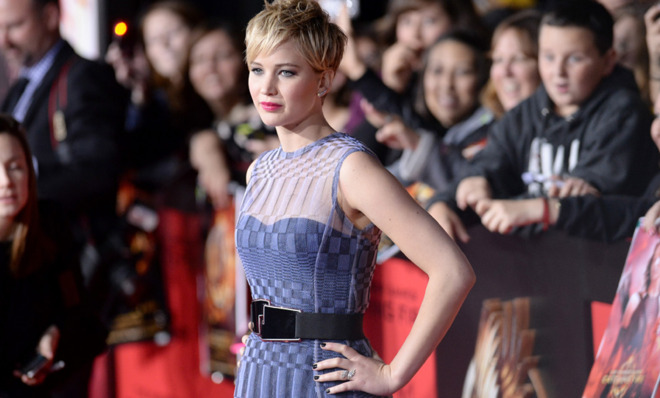Don't blame 'society' for the great selfie leak of 2014
Conservatives believe in individual responsibility when it comes to crime. Why should that change when the stolen property is a racy photo?


A free daily email with the biggest news stories of the day – and the best features from TheWeek.com
You are now subscribed
Your newsletter sign-up was successful
When it comes to technology, I'm not usually one to muse on the so-called good old days. Recent advances in technology, especially in information access and dissemination, has been a nearly unalloyed boon for humanity.
That said, I do feel somewhat blessed to have encountered the selfie fad as a middle-aged man rather than a hormonally driven teenager or young adult. At my age, I cannot conceive of a less interesting use of my time than taking pictures of my unclothed body, let alone connecting them to the cloud for rapid access from multiple platforms at any one time. In fact, I'd be hard-pressed to think of a worse hobby to take up than the birthday-suit selfie, even if I were still a young man and in better shape.
These are clearly not the 1970s or 80s, but that doesn't mean that no parallels exist between then and now. Polaroid cameras needed no developing or printing, which made them mighty handy for what we now call selfies, especially for more R-rated images of one's self — or one's partners, a more common usage.
The Week
Escape your echo chamber. Get the facts behind the news, plus analysis from multiple perspectives.

Sign up for The Week's Free Newsletters
From our morning news briefing to a weekly Good News Newsletter, get the best of The Week delivered directly to your inbox.
From our morning news briefing to a weekly Good News Newsletter, get the best of The Week delivered directly to your inbox.
Unfortunately, even back then the more caddish Polaroid owners would share these pictures widely, even after assuring their paramours of strict secrecy. Young women were warned not to trust boyfriends who claimed to take these pictures just to have a keepsake of their love, and not to let those images slip out of their own possession. Those who didn't take that advice were considered at least somewhat responsible for whatever embarrassment followed.
However, today's hacking scandal — which involved the online publication of nude photos of numerous Hollywood stars — is different in important ways. The impulse to unclothe in front of the camera is still the same, and the motivations are probably similar. But the issue with the release of those photographs presents a night-and-day contrast to the non-digital age.
These photos were not shared by caddish ex-boyfriends. Nor were they like the "revenge porn" videos that some jurisdictions have tried to address over the last year. These celebrity pictures were stolen from private accounts, not shared by a contributor to the act.
Oddly, some refuse to distinguish between poor choices of trust and outright theft. A number of people have suggested that the way to keep hackers from publishing nude photographs taken in private is not to take them at all. While that's literally true — one cannot steal what does not exist — it's hardly the point. Jennifer Lawrence and the other celebrities who were victimized may have exercised poor judgment in taking those photographs, but poor judgment does not justify robbery, nor mitigate its effect in the least.
A free daily email with the biggest news stories of the day – and the best features from TheWeek.com
A crime against private property and privacy should matter more than any offense over nudity and exhibitionism — perhaps especially to conservatives. It's possible to criticize both, but it gets the priorities backward to focus on a younger generation's predilection for taking nude pictures over the actions of hackers and the failure of cloud services to protect private material.
Conservatives generally reject blame-shifting when it comes to crime and punishment; "blaming society" gets special scorn on the right. We insist on assigning guilt and responsibility for crimes on individual actors, not groups or demographics. Why should that change when real actors become the victims?
Edward Morrissey has been writing about politics since 2003 in his blog, Captain's Quarters, and now writes for HotAir.com. His columns have appeared in the Washington Post, the New York Post, The New York Sun, the Washington Times, and other newspapers. Morrissey has a daily Internet talk show on politics and culture at Hot Air. Since 2004, Morrissey has had a weekend talk radio show in the Minneapolis/St. Paul area and often fills in as a guest on Salem Radio Network's nationally-syndicated shows. He lives in the Twin Cities area of Minnesota with his wife, son and daughter-in-law, and his two granddaughters. Morrissey's new book, GOING RED, will be published by Crown Forum on April 5, 2016.
-
 The ‘ravenous’ demand for Cornish minerals
The ‘ravenous’ demand for Cornish mineralsUnder the Radar Growing need for critical minerals to power tech has intensified ‘appetite’ for lithium, which could be a ‘huge boon’ for local economy
-
 Why are election experts taking Trump’s midterm threats seriously?
Why are election experts taking Trump’s midterm threats seriously?IN THE SPOTLIGHT As the president muses about polling place deployments and a centralized electoral system aimed at one-party control, lawmakers are taking this administration at its word
-
 ‘Restaurateurs have become millionaires’
‘Restaurateurs have become millionaires’Instant Opinion Opinion, comment and editorials of the day
